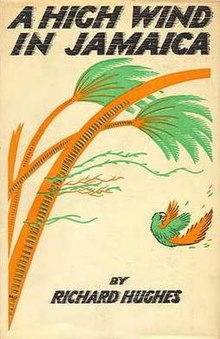The Bas-Thornton children live in Jamaica with their parents, but when a terrible hurricane levels their estate, the parents decide that it's time the children were educated in England. They send the kids off on what is to be a lengthy voyage by ship, but along the way, the ship is boarded by pirates. The pirates take everything they can, including the kids. They're kind of a nuisance to have upon a pirate ship--always underfoot, inventing games, chasing the pig or the monkey, making common objects into dolls, getting in the rigging, murdering captured sailors out of abject fear--but in a matter of months the impressionable children have pretty much forgotten all about their former life.
A High Wind in Jamaica is, above all things, a study in the peculiarity of children. The pirates are an odd bunch, but they hold no candle to the eccentricities of the Bas-Thornton kids, for whom the pirate ship adventure is all mixed up with imagination and ignorance. Hughes does a good job capturing the mental processes of kids, especially with the oldest, Emily, who idly suspects that she might be God--a clever sort of expression of the way the experience of youth is suffused with an infinite possibility that is whittled down as you become a teenager. But he refuses to enter the consciousnesses of the younger kids, insisting that it is almost impossible:
Possibly a case might be made out that children are not human either: but I should not accept it. Agreed that their minds are not just more ignorant and stupider than ours, but differ in kind of thinking (are mad, in fact): but one can, by an effort of will and imagination, think like a child at least in a partial degree--and even if one's success is infinitesimal it invalidates the case: while one can more think like a baby, in the smallest respect, than one can think like a bee.
Hughes walks an interesting tightrope here, capturing the life of children as well as he does while still operating at a remove from them that suggests he doesn't really know what's going on in their minds at all.
He shows us how mutable they can be, for one. Life on a pirate ship, for a child, is no more nightmarish or weird than the productions of their own brains. See how Emily treasures the memory of the earthquake she experienced in Jamaica as a real happening, but seems to have no recognition that being captured by pirates is something out of the ordinary. (In fact, most of the children seem unaware that they've been captured at all, assuming that the transfer from one ship to another is just a part of the voyage they keep forgetting.) There are more chilling--and spoilery--examples. One of the children dies by falling from a parapet in Cuba, trying to see a fight between circus animals, and is quickly forgot by all of his siblings. (Hughes does a good job making us forget him, too, until the end when the children are reunited with their parents, and their mother asks, "Wait, where's John?") Somehow worse than that is the coda, when Emily, who grows close to the captain Jonsen over the voyage, in the unexamined way that children do, takes the stand in England and fails to exonerate the captain for a murder he did not commit, never realizing that she sends him to the gallows.
A High Wind in Jamaica is weird, funny, and dark, a kind of poisonous take on Peter Pan, which itself is actually quite dark. Here it's the pirates who are the victims, locked out as they are from the impenetrable psyche of their own captives, who can't even understand that they are captive. Unlike Peter Pan, in which growing up is frightening specter, it's childhood itself that is terrifying.


No comments:
Post a Comment